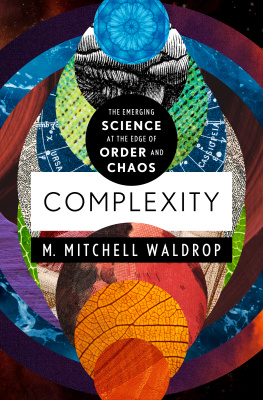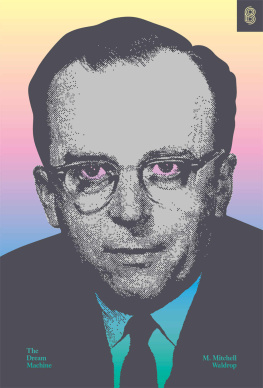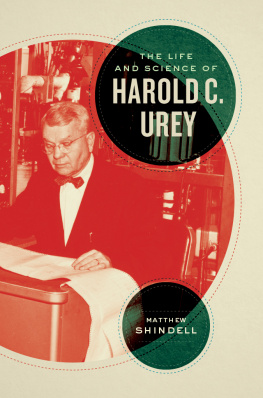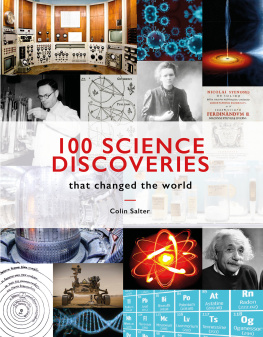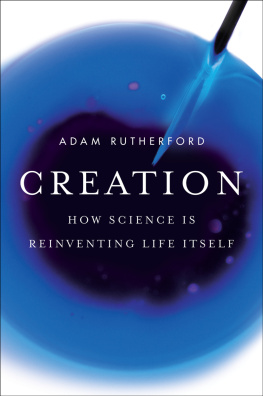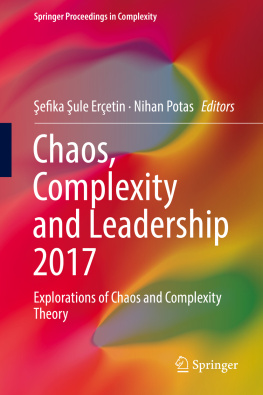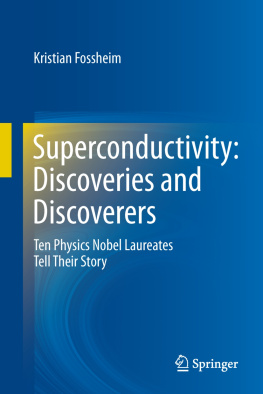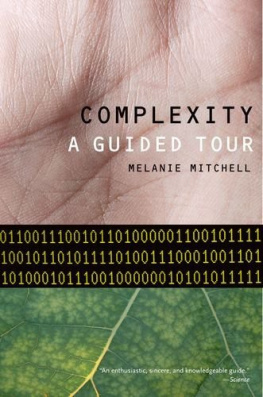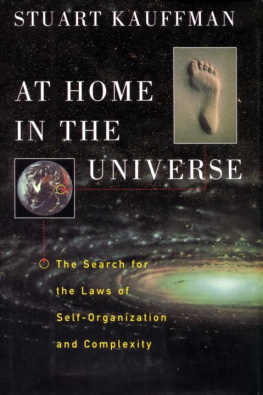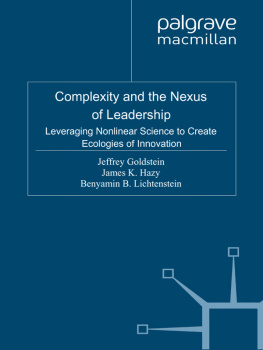Pagebreaks of the print version


Complexity
The Emerging Science at the Edge of Order and Chaos
M. Mitchell Waldrop
To A. E. F.
Visions of the Whole
This is a book about the science of complexity a subject thats still so new and so wide-ranging that nobody knows quite how to define it, or even where its boundaries lie. But then, thats the whole point. If the field seems poorly defined at the moment, its because complexity research is trying to grapple with questions that defy all the conventional categories. For example:
Why did the Soviet Unions forty-year hegemony over eastern Europe collapse within a few months in 1989? And why did the Soviet Union itself come apart less than two years later? Why was the collapse of communism so fast and so complete? It surely had something to do with two men named Gorbachev and Yeltsin. And yet even they seemed to be swept up in events that were far beyond their control. Was there some global dynamic at work that transcends individual personalities?
Why did the stock market crash more than 500 points on a single Monday in October 1987? A lot of the blame goes to computerized trading. But the computers had been around for years. Is there any reason why the crash came on that particular Monday?
Why do ancient species and ecosystems often remain stable in the fossil record for millions of yearsand then either die out or transform themselves into something new in a geological instant? Perhaps the dinosaurs got wiped out by an asteroid impact. But there werent that many asteroids. What else was going on?
Why do rural families in a nation such as Bangladesh still produce an average of seven children apiece, even when birth control is made freely availableand even when the villagers seem perfectly well aware of how theyre being hurt by the countrys immense overpopulation and stagnant development? Why do they continue in a course of behavior thats so obviously disastrous?
How did a primordial soup of amino acids and other simple molecules manage to turn itself into the first living cell some four billion years ago? Theres no way the molecules could have just fallen together at random; as the creationists are fond of pointing out, the odds against that happening are ludicrous. So was the creation of life a miracle? Or was there something else going on in that primordial soup that we still dont understand?
Why did individual cells begin to form alliances some 600 million years ago, thereby giving rise to multicellular organisms such as seaweed, jellyfish, insects, and eventually humans? For that matter, why do humans spend so much time and effort organizing themselves into families, tribes, communities, nations, and societies of all types? If evolution (or free-market capitalism) is really just a matter of the survival of the fittest, then why should it ever produce anything other than ruthless competition among individuals? In a world where nice guys all too often finish last, why should there be any such thing as trust or cooperation? And why, in spite of everything, do trust and cooperation not only exist but flourish?
How can Darwinian natural selection account for such wonderfully intricate structures as the eye or the kidney? Is the incredibly precise organization that we find in living creatures really just the result of random evolutionary accidents? Or has something more been going on for the past four billion years, something that Darwin didnt know about?
What is life, anyway? Is it nothing more than a particularly complicated kind of carbon chemistry? Or is it something more subtle? And what are we to make of creations such as computer viruses? Are they just pesky imitations of lifeor in some fundamental sense are they really alive?
What is a mind? How does a three-pound lump of ordinary matter, the brain, give rise to such ineffable qualities as feeling, thought, purpose, and awareness?
And perhaps most fundamentally, why is there something rather than nothing? The universe started out from the formless miasma of the Big Bang. And ever since then its been governed by an inexorable tendency toward disorder, dissolution, and decay, as described by the second law of thermodynamics. Yet the universe has also managed to bring forth structure on every scale: galaxies, stars, planets, bacteria, plants, animals, and brains. How? Is the cosmic compulsion for disorder matched by an equally powerful compulsion for order, structure, and organization? And if so, how can both processes be going on at once?
At first glance, about the only thing that these questions have in common is that they all have the same answer: Nobody knows. Some of them dont even seem like scientific issues at all. And yet, when you look a little closer, they actually have quite a lot in common. For example, every one of these questions refers to a system that is complex , in the sense that a great many independent agents are interacting with each other in a great many ways. Think of the quadrillions of chemically reacting proteins, lipids, and nucleic acids that make up a living cell, or the billions of interconnected neurons that make up the brain, or the millions of mutually interdependent individuals who make up a human society.
In every case, moreover, the very richness of these interactions allows the system as a whole to undergo spontaneous self-organization . Thus, people trying to satisfy their material needs unconsciously organize themselves into an economy through myriad individual acts of buying and selling; it happens without anyone being in charge or consciously planning it. The genes in a developing embryo organize themselves in one way to make a liver cell and in another way to make a muscle cell. Flying birds adapt to the actions of their neighbors, unconsciously organizing themselves into a flock. Organisms constantly adapt to each other through evolution, thereby organizing themselves into an exquisitely tuned ecosystem. Atoms search for a minimum energy state by forming chemical bonds with each other, thereby organizing themselves into structures known as molecules. In every case, groups of agents seeking mutual accommodation and self-consistency somehow manage to transcend themselves, acquiring collective properties such as life, thought, and purpose that they might never have possessed individually.
Furthermore, these complex, self-organizing systems are adaptive , in that they dont just passively respond to events the way a rock might roll around in an earthquake. They actively try to turn whatever happens to their advantage. Thus, the human brain constantly organizes and reorganizes its billions of neural connections so as to learn from experience (sometimes, anyway). Species evolve for better survival in a changing environmentand so do corporations and industries. And the marketplace responds to changing tastes and lifestyles, immigration, technological developments, shifts in the price of raw materials, and a host of other factors.
Finally, every one of these complex, self-organizing, adaptive systems possesses a kind of dynamism that makes them qualitatively different from static objects such as computer chips or snowflakes, which are merely complicated. Complex systems are more spontaneous, more disorderly, more alive than that. At the same time, however, their peculiar dynamism is also a far cry from the weirdly unpredictable gyrations known as chaos. In the past two decades, chaos theory has shaken science to its foundations with the realization that very simple dynamical rules can give rise to extraordinarily intricate behavior; witness the endlessly detailed beauty of fractals, or the foaming turbulence of a river. And yet chaos by itself doesnt explain the structure, the coherence, the self-organizing cohesiveness of complex systems.

